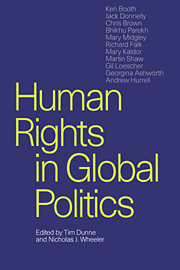Book contents
- Frontmatter
- Contents
- List of contributors
- Preface and acknowledgements
- Introduction: human rights and the fifty years' crisis
- I Theories of human rights
- 1 Three tyrannies
- 2 The social construction of international human rights
- 3 Universal human rights: a critique
- 4 Non-ethnocentric universalism
- 5 Towards an ethic of global responsibility
- II The practices of human wrongs
- Index
4 - Non-ethnocentric universalism
Published online by Cambridge University Press: 05 June 2012
- Frontmatter
- Contents
- List of contributors
- Preface and acknowledgements
- Introduction: human rights and the fifty years' crisis
- I Theories of human rights
- 1 Three tyrannies
- 2 The social construction of international human rights
- 3 Universal human rights: a critique
- 4 Non-ethnocentric universalism
- 5 Towards an ethic of global responsibility
- II The practices of human wrongs
- Index
Summary
Responses to moral diversity
The obvious fact that different societies organise their moral lives differently and entertain different, even conflicting, conceptions of the good life has been noted and commented upon in almost all civilisations. In Western thought, reflections on the subject go back to the ancient Greeks, and have given rise to several responses, of which three have proved most influential. For convenience, I will call them relativism, monism and minimum universalism.
For the relativist, different societies throw up different systems of moral beliefs depending on such things as their history, traditions, geographical circumstances, and views of the world. We have no means of judging them for there are no objective and universal criteria available for the purpose, and even if there were, we would be too deeply conditioned by our own society to discover them. Unlike scientific inquiry, moral beliefs make no assertions about the world, and cannot be judged on the basis of an objectively ascertainable knowledge of the world. We cannot judge them on the basis of human nature either, because it does not exist or we are too profoundly shaped by our culture to acquire an unbiased knowledge of it.
For the relativist, members of a society grow up imbibing the prevailing system of beliefs and are not only entitled to, but can do no other than, live by them. The relativist admits that different systems of beliefs sometimes converge and agree on a body of values, but denies moral significance to such a consensus. It is a mere coincidence and does not imply that cross-culturally shared beliefs are rooted in and dictated by human nature, or true, or more true than those unique to each culture.
- Type
- Chapter
- Information
- Human Rights in Global Politics , pp. 128 - 159Publisher: Cambridge University PressPrint publication year: 1999
- 31
- Cited by

